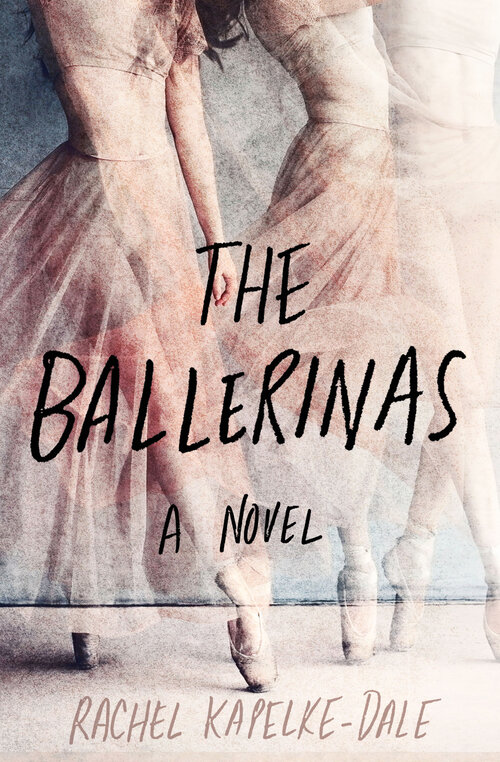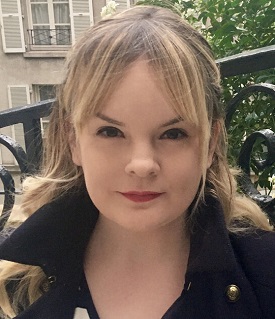 Synopsis:
Synopsis:
The Ballerinas is the voice-driven debut novel from Rachel Kapelke-Dale about a trio of ballerinas who meet as students at the Paris Opera Ballet School.
Thirteen years ago, Delphine Léger abandoned her prestigious spot as a soloist at the Paris Opera Ballet for a new life in St. Petersburg. When she left Paris, she took with her a secret that, if revealed, would upend the lives of her best friends, fellow dancers Lindsay and Margaux.
Now thirty-six years old, Delphine returns to her former home and the legendary Palais Garnier Opera House to choreograph the ballet that will kickstart the next phase of her career. And she hopes to finally set things right with her former friends.
But Delphine quickly discovers how many things have changed while she’s been away . . . and some secrets can’t stay buried forever.
Told from alternating voies and time periods, The Ballerinas is an examnation of the complexities of female friendship, the relentless pursuit of physical perfection in the name of artistic expression, the double-edged sword of ambition and passion, and the sublimated rage that so many women hold inside.
Review:

Rachel Kapelke-Dale grew up in Milwaukee, Wisconsin, the daughter of a poet and professor of writing. She spent years in intensive ballet training prior to earning a B.A. from Brown University, M.A. from the Université de Paris VII, and Ph.D. from University College London. As a student at Brown University, she was recognized as an outstanding student in the study of Shakespeare and she has published a number of academic works. She co-authored a memoir, Graduates in Wonderland, with Jessica Pan, and has penned classical Hollywood satire for Vanity Fair Hollywood, personal essays for Refinery29 and Thought Catalog, especially about Paris and London, as well as travel articles. The Ballerinas is her first novel.
Kapelke-Dale says she wrote the early drafts in 2019 when she had just returned to Paris (where she earned her M.A.) after a years-long absence, and reunited with old friends. “I wanted to write about a character going through something similar.” The Ballerinas is an exploration of female friendships set within the world of professional ballet where competition is a fierce motivator. For Kapelke-Dale, little research was required, aside from learning about the workings of the Paris Opera Ballet. “My training allowed me to sketch in the background action for various scenes without too much trouble, as the format of those classes is so deeply ingrained in my memory,” she relates. The story features three dancers: Delphine, Lindsay and Margaux, who all began studying at the Paris Opera Ballet when they were young girls. Over the years, they are intensely focused on the careers to which they aspire. As they mature, they might secure spots as members of the ballet company or, if they are good enough, become soloists or principal dancers, featured in productions. The path to becoming a principal dancer is long and fraught, requiring not just superior talent, dedication, and tireless preparation, but the ability to navigate the politics of getting noticed and championed by the ballet company’s teachers, choreographers, and artistic directors.
For Delphine Léger, dance is a family matter. Her mother was a star ballerina whose career was cut short by her unplanned pregnancy. Delphine feels pressure not just to live up to her mother’s example, but her expectation that Delphine will avoid making the same mistake she did and enjoy a long, successful career. Lindsay and Margaux also struggle with the stressors that challenge young dancers as they mature, including the never-ending effort to maintain an ideal body even as natural changes threaten to render perfection unattainable, the harsh criticisms of instructors (“You start out a whole and then you break,” Delphine observes), expectations of parents and family members, and the destruction and debilitating effects of self-doubt and competition that can drive fragile adolescents to behave in harshly shocking ways.
It is 2018, and Delphine has decided that “Paris is always a good idea.” After a thirteen-year absence, she has returned to Paris to choreograph Rasputin, a ballet she wanted to stage the entire time she was in St. Petersburg working as a choreographer at the Mariinsky Ballet with her romantic partner. And she has definite ideas about who she wants to star in the production: her old friend Lindsay, who has been a soloist for years. But Lindsay is now thirty-five years old – the company has a mandatory retirement age of forty-two — and not a good partner. But Delphine is convinced that her staging of the classic, with Lindsay as the tsarina, will revitalize the company . . . as well as her friends’ careers. Nathalie Dorival, the artistic director, reluctantly agrees to give Delphine one month to determine if Lindsay is up to the challenge. But she must name an understudy — an insult to a ballerina of Lindsay’s status. Delphine must accept Nathalie’s condition because the production will be mounted as part of the opera’s three hundred and fiftieth anniversary season, she desperately wants to make the most of the opportunity Nathalie has given her by agreeing to take her back into the company, . . . and she is intent on giving Lindsay “something that would change her life. Fourteen years after I had ruined it.” Delphine’s one true love, Jock (formerly Jacques), will be Lindsay’s co-star, and there will be a role for Margaux, as well. While Lindsay is eager to take on the role Delphine is customizing for her, Margaux is resentful and suspicious, given that Delphine has been out of there lives for so many years and failed to make an effort to maintain their friendship. Kapelke-Dale says Margaux is “disillusioned,” but do not have any training to pursue a different career and has “taken her frustration and turned it in on herself.”
Delphine’s first-person narration moves back to 1995, when Delphine, Lindsay, and Margeaux are students . . . and competitors. Kapelke-Dale notes that it was her editor who recommended adding the second timeline in order to fully reveal the characters’ pasts. She immerses readers in the girls’ world, providing insight into the grueling physical demands of ballet, their emotional struggles, the imbalance of power in their relationship, and the machinations it inspires, including one particularly stunning betrayal. As the narrative moves incrementally forward in time, Kapelke-Dale reveals the characters’ secrets at deftly-timed intervals, providing context for their behavior and illuminating their motivations.
The Ballerinas is a taut, evenly-paced, and absorbing glimpse into the world of ballet. Delphine would be easy to dismiss as unlikable and, therefore, irredeemable. But that misses the point. Delphine is a product of the world into which she was born, and all the people and events that influence her. She is self-centered, selfish, driven, and vengeful. But she also cares about her friends and colleagues, and eventually returns to Paris intent on making up for her mistakes. But is it too late?
The themes Kapelke-Dale delves into through her characters resonate against the ballet backdrop, they are universal. Female friendships are complicated, but their complexity is magnified in Kapelke-Dale’s convincing portrayal of women facing consequential choices about reproduction, work-life balance, and workplace harassment and abuse in an industry where men have, for centuries, been the powerbrokers and women have been vulnerable to and dependent upon their desires, whims, and approval. Kapelke-Dale says that as she was writing the book, she thought deeply about an institution that “purportedly celebrate femininity in some ways also reinforce draconian standards,” and wanted to impart the sense of urging that Delphine feels as her fortieth birthday looms and she wonders if her best professional years are behind her. Ultimately, her characters must decide how they will shape their futures, what matters most to them, and what kind of people they want to be. Kapelke-Dale delivers an entertaining story with a conclusion that is nothing less than jaw-dropping, despite early foreshadowing because so much transpires in succeeding chapters.
Excerpt from The Ballerinas
CHAPTER 1
September 1995
Margaux stumbled into my dorm room, groaning as she fell back against the wall. “I hate the yellow.”
“You love the yellow.”
She scanned my body. “It’s not fair. You’re so pale, you look great in pastels. So basically, you’ll be there looking perfect until we graduate, and I’ll be over here looking like — like –”
Like she had the stomach flu. But even at thirteen, I knew better than to finish the thought for her. Every year, we had a new leotard color, and every year, it was a pastel that washed her out. With her brown hair and hazel eyes, her warm beauty looked better in anything else: reds, golds, oranges. She was a Summer, one of our magazines had told us the previous year. With my black hair and blue eyes, I was a classic Winter.
“You’ll get to wear white in a couple of years.”
But we both knew it wasn’t as easy as just waiting. About a quarter of our class disappeared each year after exams. Those final summer days were both exhilarating and heartbreaking as girls — friends — sobbed outside the gates where the school posted our results. We hugged them. We patted their backs. And all the time, our insides were soaring because it wasn’t us. We were still the right shape and size, still good enough.
I threw down my brush with frustration. “Will you do my hair?”
Margaux came over and started scraping the thin black strands into a bun, then let it fall as she grabbed a bottle of hair gel. My hair was too fine to stay up all day without it, and none of us had time between classes to dart back to the dorms. Margaux’s hair never fell out of its bun.
We headed down to the studio together. Ready to see who was there, ready to dismiss them as temporary. Four of our classmates had been thrown out the previous June. The school didn’t have to keep the classes the same size, but they nearly always did, taking students who’d auditioned to fill the empty spaces. This would be the last year that anybody was added to our class, though, because the school didn’t take anybody older than thirteen. Past that point, it was too late; the Paris Opera Ballet style, that famous POB touch, would never be natural to them.
“Only three new girls,” Margaux whispered as I opened the studio door.
“Yeah,” I said grimly. “But if they’re any good, three’s enough.” Enough to jeopardize everything we’d worked for, to push us from the top of the class into the great mass of mediocrities.
There’s a compact between the company, the Paris Opera Ballet, and the academy. Around 150 dancers in the company and perhaps ten have trained anywhere else. But those are always midcareer artists, foreigners. The school trains the vast majority of POB dancers from the youngest possible age, then we join their elite ranks.
Maybe we join them. Maybe some of us will. POB takes ten times more students than it can ever accept into the company, in the hopes that just one will yield the desired results. Which means attending the school is necessary if you want to join the company — but it’s not enough.
Even at thirteen years old, each and every one of us was sure we would be among the chosen. But we kept a hunter’s watch on the competition anyway. We entered the studio with wary eyes and curtsied to the teacher, Marie-Cécile. There were Aurélie and Mathilde, Corinne and Talitha. Some new girl with an overbite so severe that they’d never let her into the company if she didn’t get serious dental work done, fast. POB likes them pretty. A mousy girl, on the small side, staring down at her legs as she stretched, unwilling to look back at us.
And then there was Lindsay.
Twelve, thirteen. It’s the age when everyone’s just legs and eyes, and her wary gaze landed on ours. Beautiful, I thought. It was the first time I’d ever consciously thought that about somebody my age. It was also the first time I recognized that someone was unequivocally prettier than I was. Lindsay had so much hair that her blond bun looked like it was containing an explosion; enormous blue eyes; velvety rose-petal skin.
Class began. She seemed good at barre work, but you can’t tell anything until you get into the center. It’s too hard to really watch someone else at the barre: you’re all lined up and you flip around to work both sides for each combination, the exercises of strung-together warm-up steps. I could actually study her technique only half the time.
I heard my mother’s voice. Focusing on others won’t get you anywhere. Focus on yourself.
But Lindsay was all I could see.
She took a place at the front of the class; she wasn’t ducking out from Marie-Cécile’s gaze just because she was new. Running through the sequences of steps, she had an easy grace. Unlike Mathilde and Talitha, she made it through even the hardest combinations without losing her breath. But it wasn’t until adagio that I saw how good her extension was: she could raise her leg within inches of her head with a pure, steady strength.
She was better than any of us. Better than either me or Margaux, who consistently ranked first and second in our class.
Then we changed our shoes for pointe work and I saw we wouldn’t have to worry.
“Ladies,” Marie-Cécile called, clapping her hands. “Back to the barre, please.”
We’d been en pointe for only a year by then, but we all had our routines down flat. Bandages around the toes—no, I prefer medical tape — put a blister pad there for prevention, but only after you have the callus — coat it all with lambswool. But Lindsay hadn’t mastered it yet. Piles of fluffy wool and American Band-Aid wrappers around her, she sat there frantically trying to stuff her toes into shoes that were just too small for all the shit she was trying to put in there.
“Stop dawdling, Miss Price.”
Lindsay looked up, eyes wide, as Marie-Cécile put her hands on her hips; Margaux and I exchanged glances. It was never good when Marie-Cécile called you out directly. That posture was the only warning sign you ever got before she really lost it.
We all watched as Lindsay tried to shove the overstuffed shoe onto her foot, to pull the back of it up over her heel. As it dangled uselessly off of her toes, she glanced up again.
“Well,” Marie-Cécile said. “Perhaps we should all come back in half an hour, once you’re ready?”
The giggle broke through the eight of us like a wave. And there: there it was. The first time we really saw Lindsay. Glowering up at us all—her gaze frantic, still, but hateful now, too.
She threw her shoe across the room, where it bounced off of the mirror with a satin thump.



Comments are closed.